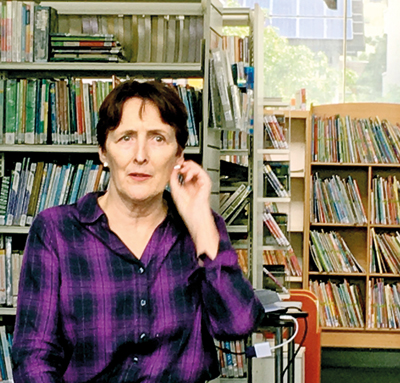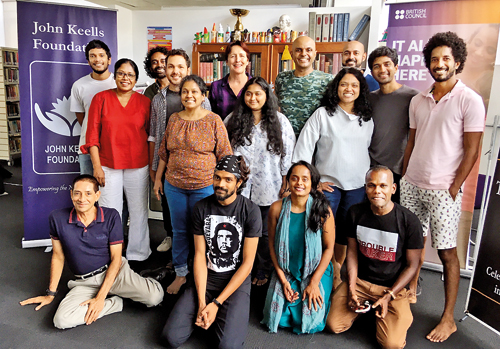Making of a good play

The truth of emotions: Fiona Shaw conducting the Masterclass
A good script needs to draw audiences into a play from the word go, and language isn’t its only element,” said British actress Fiona Shaw conducting a masterclass for leading local theatre professionals on December 23.
An award-winning Irish actress, theatre and opera director, Shaw is most popularly known for her role as Petunia Dursley in the Harry Potter series, as Marnie Stonebrook in season four of the HBO series True Blood, and as Carolyn Martens in the BBC America series Killing Eve. She has also worked extensively with the Royal Shakespeare Company and the National Theatre of Great Britain. She won the 2019 BAFTA TV Award for Best Supporting Actress, the Primetime Emmy Award nominations for Outstanding Supporting Actress in a Drama Series, and Outstanding Guest Actress in a Comedy Series. She has also won the Olivier Award for Best Actress for various roles. In 2001 she was awarded an Honorary CBE.
The masterclass taking the participants through the process of weaving visual and experiential aspects of a play into a script was organised by the Gratiaen Trust in partnership with the John Keells Foundation which sponsored logistical expenses, and the British Council which provided the venue. Taking part were playwrights who have won, been shortlisted or judged the Gratiaen Prize and actors working with these playwrights. The masterclass was the first in a series the Gratiaen Trust plans to hold, in which renowned writers and artists will share their expertise to strengthen the creative writing of Gratiaen authors.

Workshop participants with Fiona Shaw at the Biritsh Council
Amongst those who took part were – Sumathy Sivamohan, Seneka Abeyratne, Jehan Aloysius, Delon Weerasinghe, Arun Welendawe Prematilleke, Ruhanie Perera, Jake Oorloff, Nadee Kammallaweera and Visakesa Chandrasekaram. Kaushalya Fernando, Bandhuka Premawardena, Imesha Athukorale, Brandon Ingram, Rajinda Jayasinghe and Akalanka Prabashwara assisted the playwrights by enacting selected scenes.
Fiona Shaw took participants through several exercises that highlighted how a good playscript weaves emotions, rhythms, movement and sound to communicate. Ms. Shaw stressed that experiential aspects or “the truth of emotion” generated in the audience is often not dependent on language itself. Much of the masterclass was spent, therefore, on the importance of creating mood, rhythm and movement. With these tools, she demonstrated how a playwright could actually write less to provide more room for actors to lend their creative interpretations to a play.
Jehan Aloysius spoke for many participants when he said that the masterclass was stimulating and creative because it shook long held beliefs about text, language, performance and habit. Scenes enacted were stripped apart and re-played using different techniques and phrases.
Ms. Shaw who took the masterclass entirely on a voluntary basis, gave generously of her time and expertise, drawing from her wide range of experience working in the Shakespearean theatre, comedy and film.


